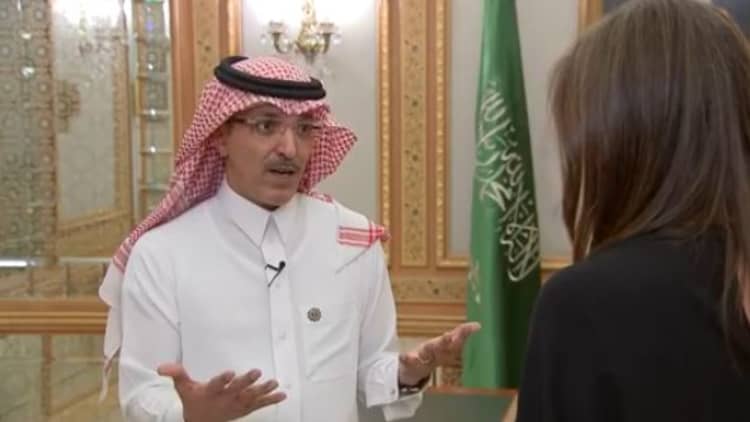President Donald Trump on Friday said he "called up" OPEC and told the producer group to take action to bring down fuel costs, making a dubious claim that gasoline prices are already falling.
Crude futures extended earlier losses after Trump's statement. U.S. West Texas Intermediate crude was down 3.4% at $63.01 per barrel, while international benchmark Brent crude fell 3.2% to $71.98.
"The gasoline prices are coming down. I called up OPEC. I said, 'You've got to bring them down. You've got to bring them down,' and gasoline's coming down," Trump told reporters en route to a National Rifle Association event in Indianapolis.
In fact, the national average for a gallon of regular gasoline is $2.883 per gallon, up from $2.877 a day ago and $2.839 a week ago, according to AAA. Wholesale U.S. gasoline prices have ticked lower in recent days, but are still up about 10% from a week ago and nearly 7% from a month ago.
It was not immediately clear whether Trump meant that he had contacted the OPEC Secretariat in Vienna, or whether he was referring to OPEC members and close U.S. allies like Saudi Arabia and the United Arab Emirates. OPEC could not immediately be reached for comment.
The Wall Street Journal reported that OPEC's Secretary General Mohammed Barkindo has not spoken to Trump, citing a source. Saudi officials also told the Journal that Trump has not discussed lowering prices with them.

Earlier this week, the administration said it will not extend waivers that allow several countries to continue buying Iranian crude despite U.S. sanctions on the Islamic Republic. Oil prices surged more than 3% in the two days after the announcement.
The administration said it has secured commitments from Saudi Arabia, the UAE and other allies to fill any gap left by the anticipated drop in Iranian supplies.
However, influential Saudi Energy Minister Khalid al-Falih said earlier this week that there is no need to immediately start pumping more oil, and the kingdom will hike output only after customers ask for more supplies.
Bill Farren-Price, a geopolitical analyst at RS Energy Group, said there is subtle but considerable dissonance between the U.S. and Saudi statements following the sanctions waiver announcement.
"I think when you actually analyze what the Saudis have said, it's actually just a broad restatement of their existing supply policy, which is that they will always seek to work to keep markets balanced and make up the shortfall," he said.
Many analysts believe OPEC members are unlikely to proactively lift production, largely because oil prices collapsed after the Saudis and other producers took similar actions ahead of the renewal of Iranian energy sanctions last year. That could tighten global oil supplies in the short term, supporting Brent prices in the $70-$75 per barrel range.
"I think any shift to add barrels if there is a deficit will be deliberate but quite slow and mindful of the broader market balance, which is pretty oversupplied especially heading to 2020," Farren-Price said.
OPEC and its oil market allies, including Russia, have been trying to keep 1.2 million barrels per day off the market to drain an oversupply of crude and boost prices following the collapse. U.S. crude has rallied 39% this year, while Brent is up about 34%.
The Saudis can lift production without violating the agreement because they are currently pumping about 500,000 bpd below their quota.


